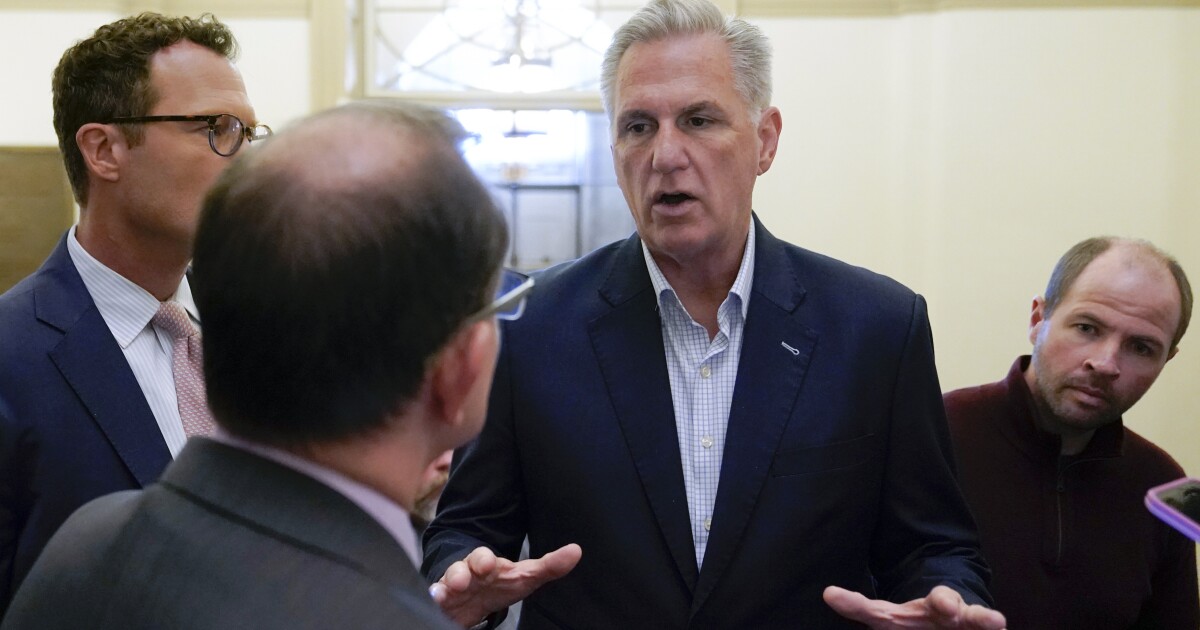

The White House and Speaker Kevin McCarthy (R-CA) have come to a tentative agreement over the debt ceiling, taking the first step to overcome a major hurdle to avoid a default on the country’s loans, a source familiar confirmed to the Washington Examiner.
The deal comes after McCarthy spoke with President Joe Biden on the phone for roughly 90 minutes Saturday night as the two leaders sought to iron out remaining holdout issues in order to finalize a deal. The details of the debt ceiling agreement is not yet known, and GOP leaders are expected to hold a conference call with House members to discuss the deal at 9:30 p.m.
YELLEN SETS NEW DEBT CEILING ‘X-DATE,’ GIVING NEGOTIATORS MORE BREATHING ROOM
The deal comes after several late nights at the Capitol for McCarthy’s top negotiators, Reps. Garret Graves (R-LA) and Patrick McHenry (R-NC), who worked until 2:30 a.m. before returning for continued negotiations just hours later on Saturday morning to continue negotiations.
Finalizing a deal is only the first step in avoiding a default, as party leaders on both sides of the aisle must now work to whip enough support within the House to get the legislation past the finish line. The House’s most progressive and conservative members have already expressed their displeasure with what provisions might be including in the bill, with many on the far right urging McCarthy not to give in to any Democratic demands.
It remains unclear if members have drafted the bill into legislative text or when that language will be available for members to review. All legislation must be available for 72 hours before coming to the House floor for a vote.
McCarthy remained adamant that the 72-hour rule would remain in place even as the June 5 default deadline nears, telling reporters on Saturday he hopes to tee it up for a vote when the House returns on Tuesday. The House went on recess Thursday afternoon for the holiday weekend, with only a handful of lawmakers remaining in Washington, D.C., as they worked to secure a deal.
Members of the Congressional Progressive Caucus have said they don’t want any work requirements in the debt ceiling bill and have pushed for a clean debt ceiling increase. Meanwhile, members of the House Freedom Caucus have said they want to see a litany of conservative priorities in the bill, including spending cuts, border security measure, and funding reductions for some federal agencies.
Before a deal had been made on Saturday, the House Freedom Caucus posted on Twitter with the hashtag #HoldTheLine, urging McCarthy not to accept a watered down version of the “Limit, Save, Grow Act.”
“Reporting indicates we’re looking down the barrel of a debt ceiling increase more than double what we passed in the #LimitSaveGrowAct,” the caucus tweeted. “While the critical policies to restore fiscal sanity and jumpstart economic growth appear immensely watered down. Unacceptable.”
The House passed that bill in April to raise the debt ceiling while also making a number of spending cuts. That bill narrowly passed the lower chamber with no Democratic support.
CLICK HERE TO READ MORE FROM THE WASHINGTON EXAMINER
Once the debt ceiling deal is passed through the House, the legislation will head to the Senate, where it could take a few days before it’s passed. After that, it’ll be sent to President Joe Biden’s desk for his signature.
The clock is ticking for Congress to advance the legislation before the so-called “X-date” on June 5, which is the day the country is expected to no longer be able to pay off its debts. Treasury Secretary Janet Yellen updated the deadline from her initial projection of June 1, buying lawmakers four extra days to finalize an agreement and get a bill passed before a possible default.





